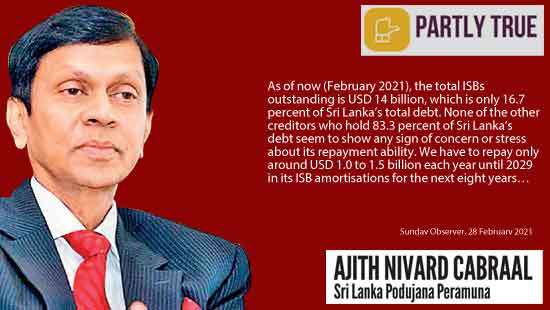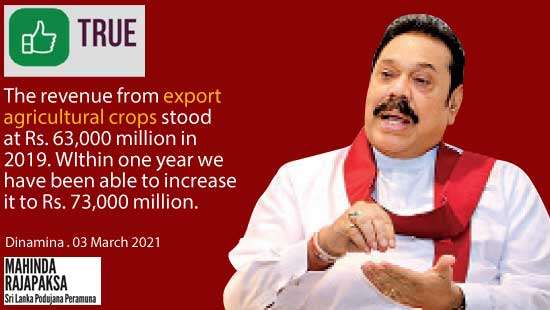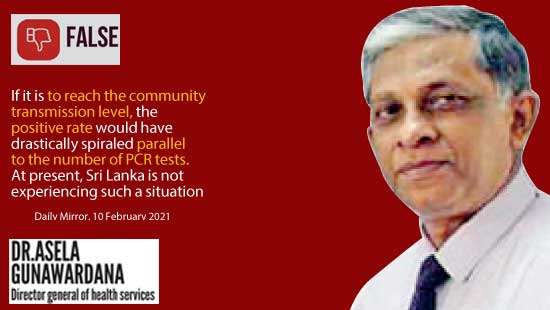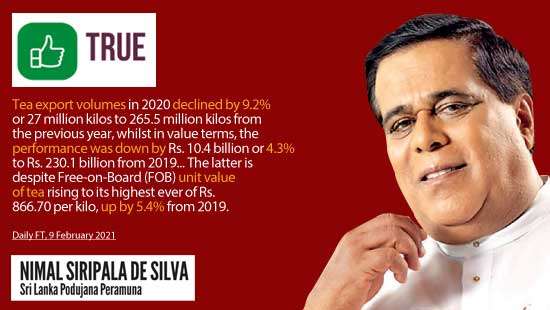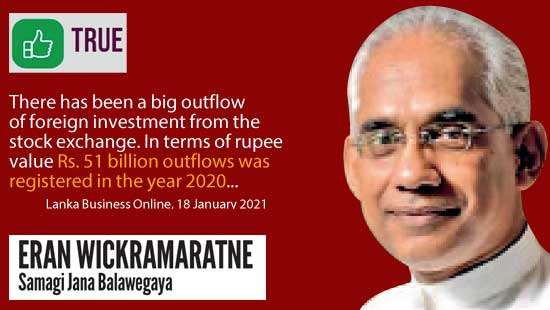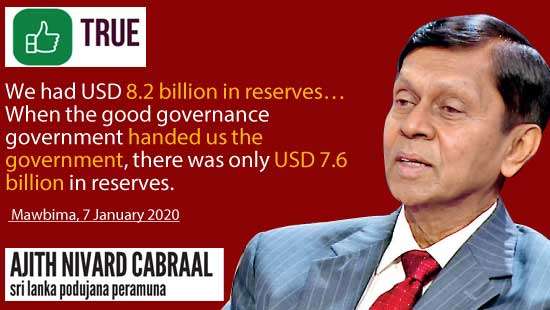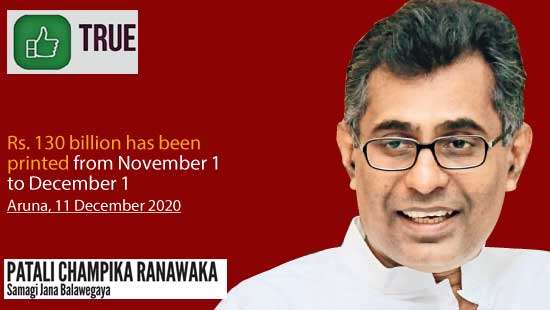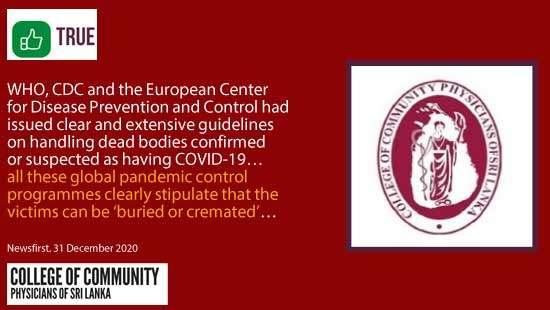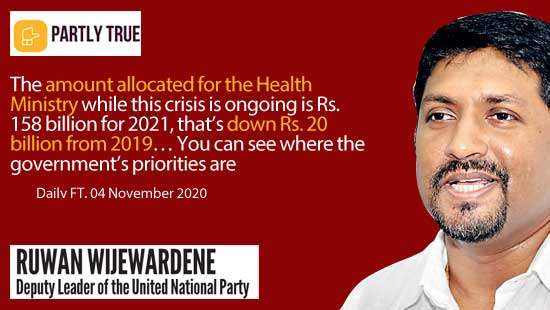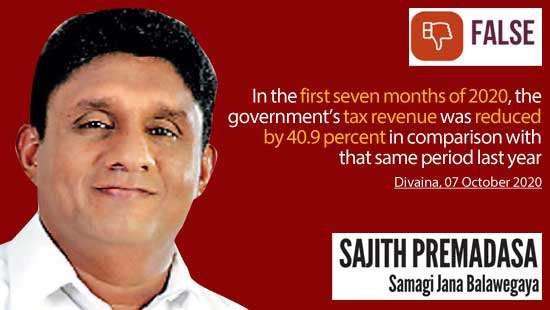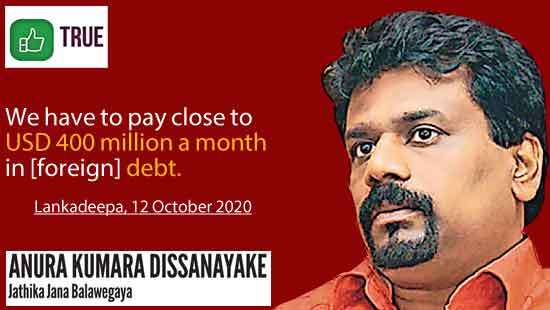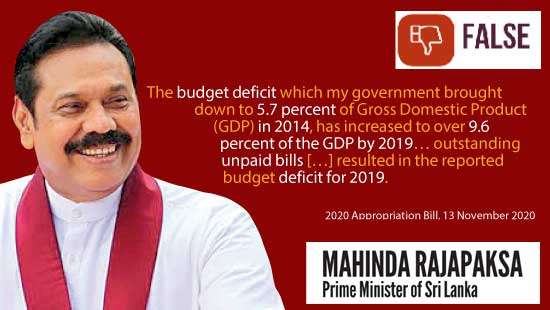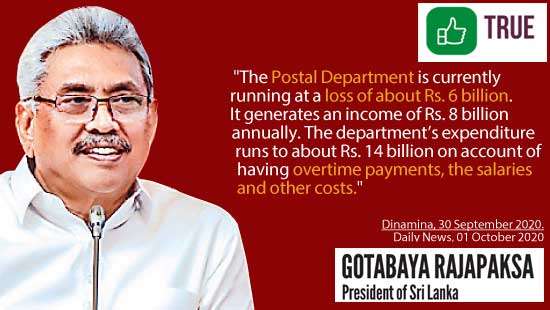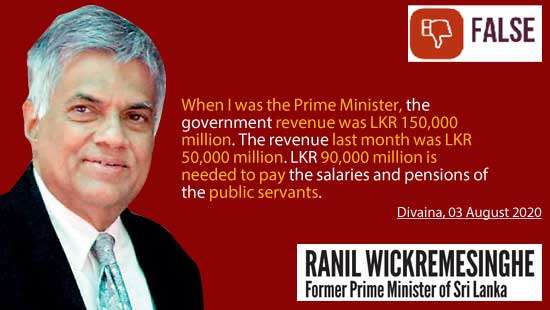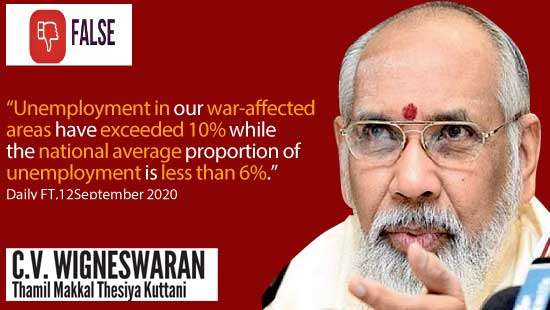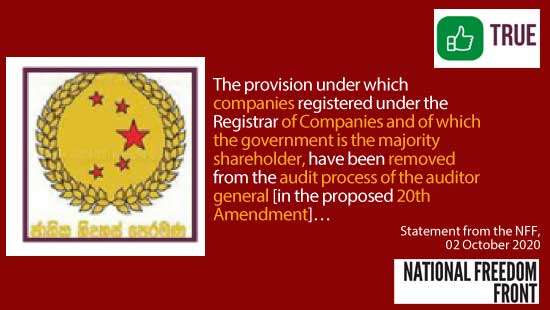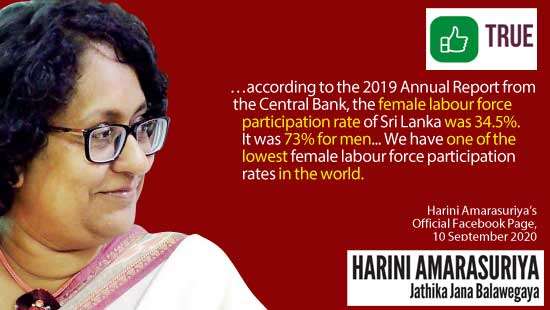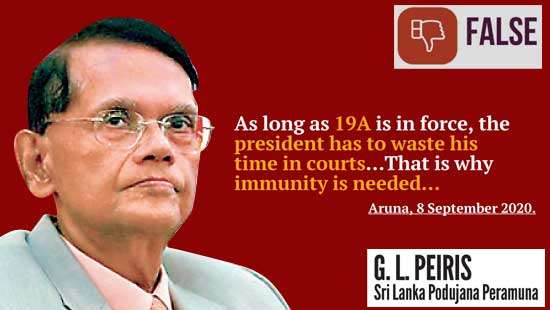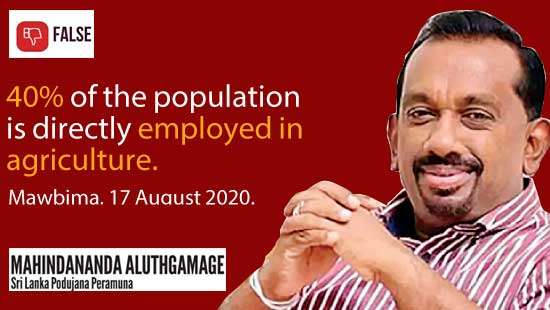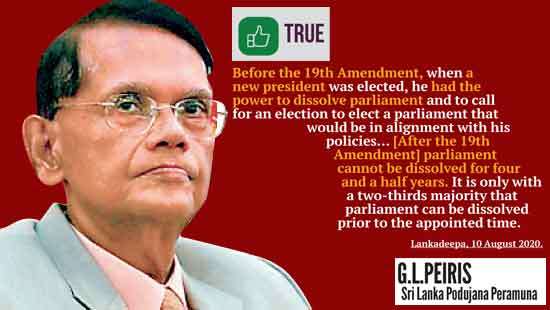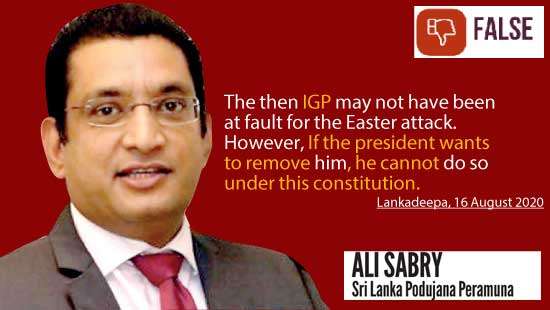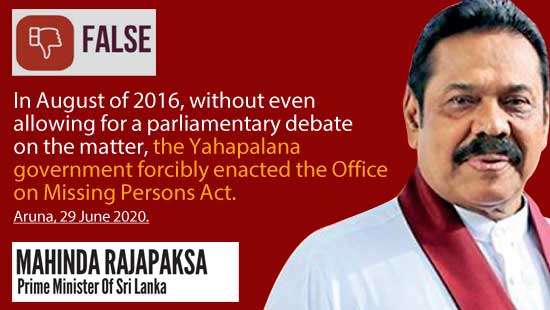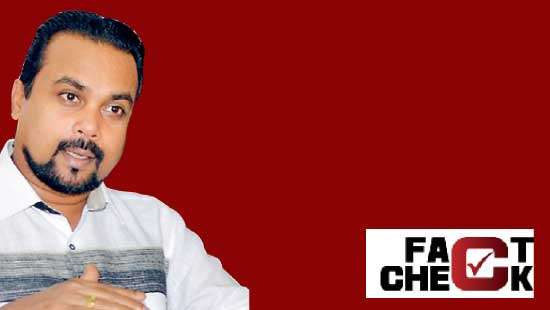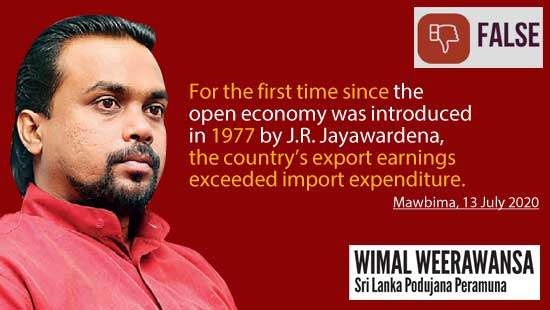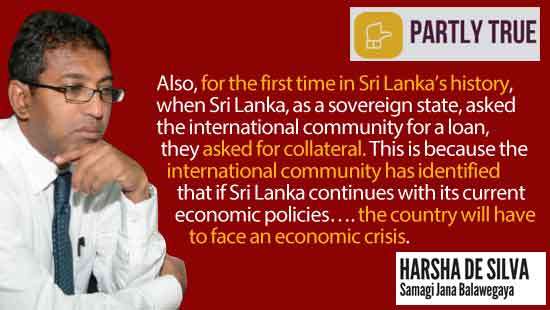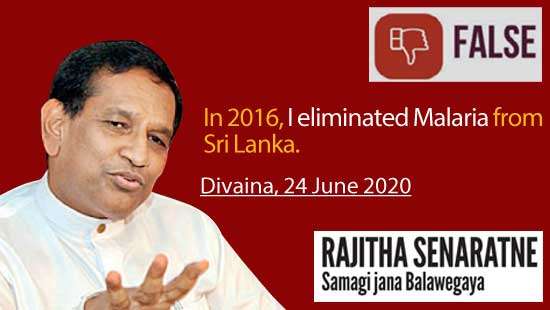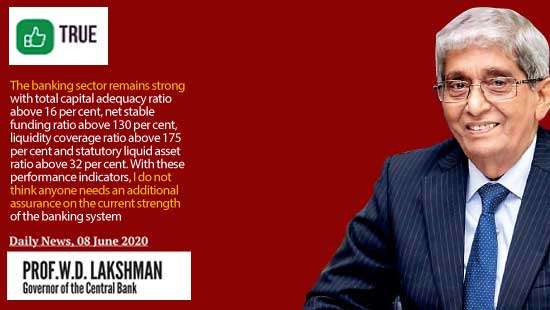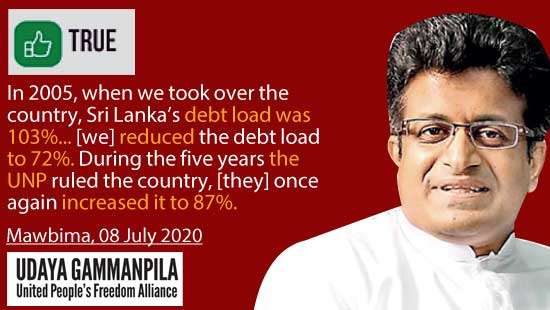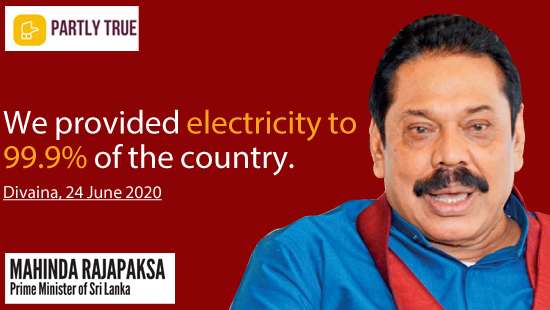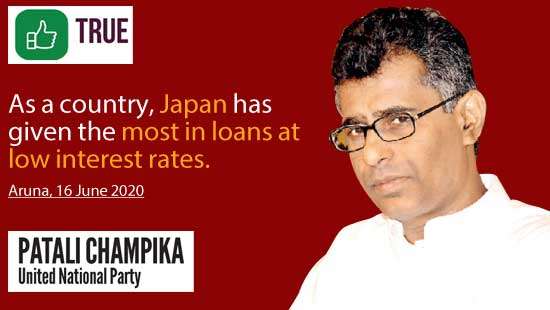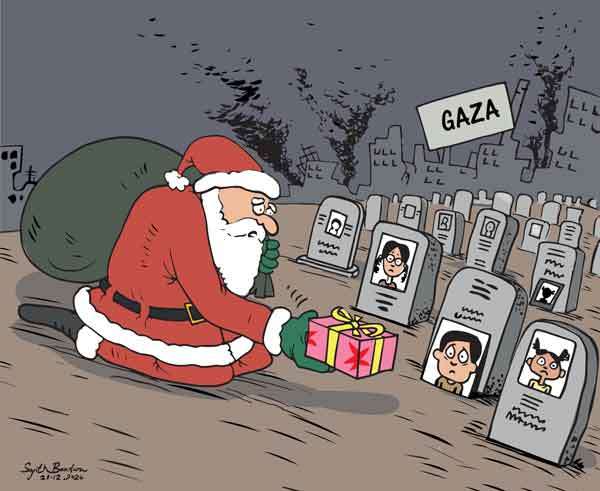Fact Check
MP Cabraal: Not without fault on debt default claims
25 Mar 2021
 0
0
Claim 1: Concerns regarding repayment or credit risk can be assessed by the rate of interest demanded by borrowers and willingness to lend. The majority of Sri Lanka’s government non-ISB debt consists of domestic rupee debt (53.5% of total debt). On this, interest rates have declined to very low levels, indicating low concern over credit risk. However, of the remaining non-ISB debt, it is no
Prime Minister Rajapaksa: yields correct understanding on export agriculture
18 Mar 2021
 0
0
Prime Minister Mahinda Rajapaksa claims that there has been an increase in the exports of export agricultural crops (EACs) during 2020 when compared to 2019. Export Agricultural Crops (EAC) refers to a set of specific crops that are under the purview of the Department of Export Agriculture. These include various spices (cinnamon, pepper, nutmeg etc.), betel leaves, areca nuts, coffee, cocoa and various essential oils.
DG Health Services sets up the wrong criteria for community spread of COVID-19
11 Mar 2021
 1
1
In his statement, the Director General (DG) of Health Services Dr. Asela Gunawardana states that if COVID-19 reaches community spread, then the positive rate will spike up as an indication. He concludes by this criteria that Sri Lanka does not have community spread. In November 2020, Fact
MP Eran Wickramaratne correctly flags foreign outflow from stocks
25 Feb 2021
 1
1
To check this claim, FactCheck consulted data from the Colombo Stock Exchange Quarterly Report and the Securities and Exchange Commission of Sri Lanka Annual Report. LKR 104 billion is recorded as the total sales value (outflow) of foreign owned stocks in the Colombo stock exchange from January 2020 to December 2020.
Money printing: MP Champika Ranawaka right on the money
21 Jan 2021
 3
3
Money printing is more formally known as deficit financing. It refers to when the Central Bank finances the government’s budget deficit by creating new money to directly purchase government securities issued by the treasury. The Central Bank’s purchases of treasury securities are reflected in the balance sheet of the Central Bank. Therefore, to quantify the money printed during the relevant period, FactCheck referred to the Central Bank’s purchas
College of Community Physicians: lays to rest concerns on Covid-19 burials
14 Jan 2021
 2
2
To check this claim, of overwhelming global support for permitting burial of Covid-19 victims, FactCheck consulted the latest available guidelines provided by the World Health Organisation (WHO) of the United Nations, Center for Disease Co
Deputy Leader of the UNP Wijewardene: technically right on health ministry budget, not on its implications
07 Jan 2021
 0
0
In his statement, former MP Ruwan Wijewardene claimed that the allocation for the Ministry of Health in 2021 was decreased by LKR 20 billion during a health crisis, compared to 2019. To check this claim, FactCheck consulted the budget estimates and publicfinance.lk.
Prime Minister Mahinda Rajapaksa fails to account for the accounting method
19 Nov 2020
 1
1
In the second reading of the 2020 Appropriation Bill, Prime Minister Mahinda Rajapaksa claimed that the budget deficit for 2019 increased to 9.6% of GDP. To evaluate this claim, FactCheck consulted annual reports from the Ministry of Finance (MoF).
Former Premier Ranil Wickremesinghe: Incorrect claims with some correct figures
05 Nov 2020
 2
2
In his statement, former Prime Minister (PM) Ranil Wickremesinghe made two claims: (1) Government revenue fell by LKR 100 billion, to LKR 50 billion, in July 2020, and (2) the required expenditure for salaries and pensions significantly ex
MP Wigneswaran overstates the unemployment disparity in war affected areas
29 Oct 2020
 0
0
To evaluate this statement, FactCheck referred to the 2019 annual report of the Sri Lanka Labour Force Surveys published by the Department of Census and Statistics (DCS). For purposes of this analysis we consider the districts falling into the
MP Amarasuriya calls out Sri Lanka’s low rank on female labour force participation
15 Oct 2020
 1
1
To assess this claim, FactCheck consulted the Labour Force Survey for Sri Lanka’s statistics and used the International Labour Organization, ILOSTAT database to compare Sri Lanka’s female labour force participation rate in 2019 with that of the rest of the world.
Minister Peiris misrepresents effect of 19A on presidential immunity
08 Oct 2020
 6
6
This statement was made in the context of the constitutional changes in the proposed 20th Amendment (20A). In his statement, Minister Peiris justifies the need for presidential immunity as provided for in the 20th Amendment, by claiming: As long as the 19th Amendment is in force, the president will have to waste his time (“rastify”) in courts. To evaluate
MP Aluthgamage on agriculture: overgrows labour statistics
24 Sep 2020
 0
0
To evaluate this claim, FactCheck consulted the latest available Labour Force Survey (LFS) statistics, which provides sector-wise estimates of employment.The average labour force engaged in agriculture, as their primary employment, was 2
Minister of Justice Ali Sabry: Misrepresents safeguards as gaps in the 19th Amendment.
10 Sep 2020
 3
3
This statement was made by Minister Sabry in explaining his opposition to the 19th Amendment (19A) to the Constitution. Through this statement he asserts that the constraints on the president to remove the Inspector General of Police (IGP) from office was brought about by 19A.
Prime Minister Mahinda Rajapaksa: Missing facts on Office on Missing Persons (OMP) Act
03 Sep 2020
 1
1
Prime Minister Mahinda Rajapaksa claimed that the former government forcibly enacted the Office of Missing Persons (OMP) Act. In his statement, the prime minister indicated that this forcible enactment in
Industries Minister Wimal Weerawansa responds to FactCheck
29 Aug 2020
 4
4
The industries Ministers Media secretary has sent the following response to the FactCheck published on page 1 of Daily Mirror on August 27: The FactCheck featured in your newspaper had been compiled using a news report published in the Mawbima newspaper of 13. 07. 2020 using a statement made by Minister Wimal Weerawansa.
Minister of Industry Wimal Weerawansa repeats misconception on export earnings
27 Aug 2020
 1
1
Minister Weerawansa here is possibly repeating a claim about trade data in June 2020 that has also been separately carried in the media. To evaluate this claim, FactCheck looked at Sri Lanka’s monthly and annual import and export data as reported by the Central Bank of Sri Lanka (CBSL).
Governor’s claim on strength of the banking system can be banked on
30 Jul 2020
 0
0
To evaluate Governor of the Central Bank of Sri Lanka (CBSL) W.D. Lakshman’s claim, FactCheck consulted the set of principles developed by the Bank for International Settlements (BIS)—an international organisation that serves and supports central banks in their pursuit of monetary and financial stability—to assess the risk taken on by global and domestic banks. Sri Lankan domestic ban
Prime Minister Mahinda Rajapaksa: over-energetic on electricity access
16 Jul 2020
 3
3
On 24 June 2020, Divaina reported Prime Minister Mahinda Rajapaksa’s above claim that his government succeeded in achieving effectively universal access to electricity (99.9% access). To evaluate this claim, FactCheck consulted data from the annual reports of the Central Bank of Sri Lanka from 2004 to 2019. In 2004—prior to the Sri Lanka Freedom Party (SLFP) forming government—74.9% of the population had access to electricity. By 2014—the final

SL exits ’Restricted Default’ rating
09 Jul 2020
 2
2

SriLankan airlines hosts agents’ tour to Gan island
09 Jul 2020
 2
2

First Capital crowned as Brand of the Year at SLIM Brand Excellence 2024
09 Jul 2020
 2
2

Bitcoin surges past $100k for first time
09 Jul 2020
 2
2

USAID, CBL group to boost SL’s coconut industry
09 Jul 2020
 2
2

crisis spirals, Govt. extends deadline for imports till January 10
09 Jul 2020
 2
2

Suspect dies after collapsing in Chilaw Police custody
09 Jul 2020
 2
2

Dayasiri defends use of President’s Fund, rejects misuse allegations
09 Jul 2020
 2
2


